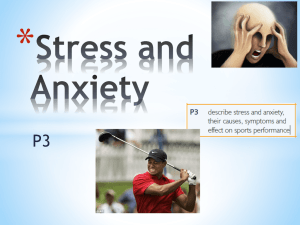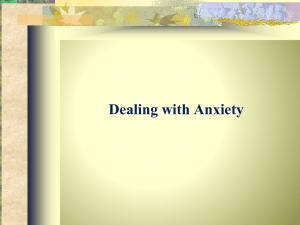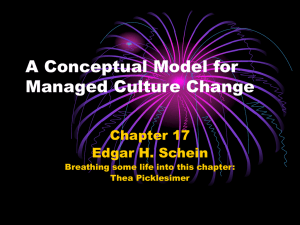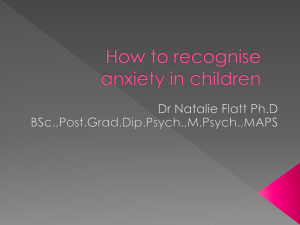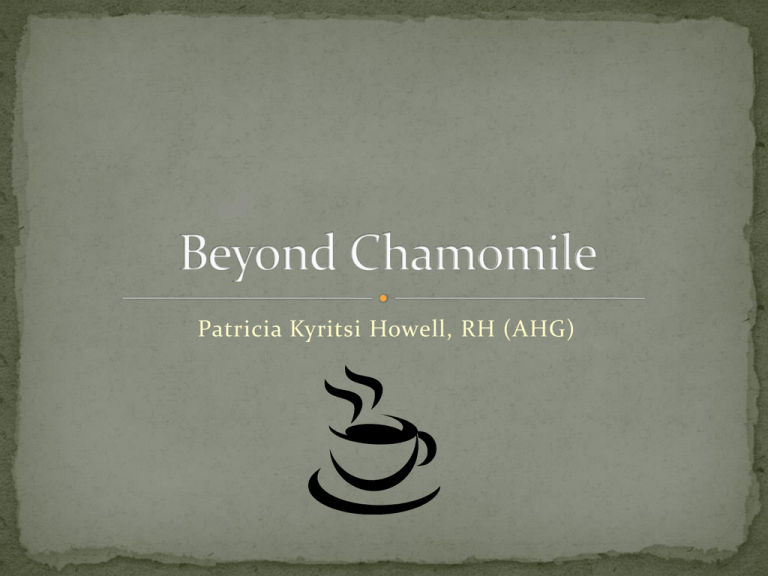
Patricia Kyritsi Howell, RH (AHG)
Adrenal response
(central medulla)
Adrenaline or noradrenalin
released into the blood
stream
Anxiety
Immediate response
“fight or flight”
Coping strategy activated
Strategy is successful,
“fight or flight”
response subsides,
anxiety and fear
dissipate
Increased heart rate, blood
pressure, surface
constriction of blood
vessels, blood moves to
muscles, liver releases
stored glucose
Strategy fails &
stress levels continue or increase
Fear
Strategy fails,
stress levels continue
or increases
Adrenal cortex
becomes involved in
stress reaction
Anterior pituitary gland releases
adrenocorticotropic hormone
(ACTH)
Damaging physiological effect of
continue release of hormones by
adrenals and pituitary glands
Increased levels of inflammation
throughout the body
Lowered levels of immune
response
Stress, anxiety
with depression,
and withdrawal.
Overall reduced
ability to cope
with stress
Fear, sense of
impending doom,
fears about the
future,
Stage is set for the
development of
illness
and disease
Fire
Wood
Kidney
Earth
Metal
Fire Element or Heart/Small Intestine
Radiates the outward expression of life force (Qi) through the
personality.
Suffuses the physical body with conscious awareness.
Collects and interprets sensual experience
Assimilates the vital essence of emotional experience
Decodes and generates symbolic communication.
Initiates and monitors the flow of intra-cellular communication.
Distributes warmth to all parts of the body.
Provides the continuous flow of Blood throughout the body.
Stores the Shen.
Characteristics of Healthy Fire:
Passionate engagement with life.
Expressive personality characterized by warmth, affection and good
humor.
Able to articulate thoughts, feelings and desires, especially joy and sorrow.
Sensual appreciation of the physical world.
Attracted to beauty, honesty and truth.
Spiritually and emotionally aware.
Rhythmic, steady cardiac function.
Even circulation of blood and nerve sensations throughout the body.
Restful sleep and good dreams.
Physical Symptoms of Fire Imbalance
Cardio-vascular problems such as heart palpitations, arrhythmia, angina, heart weakness,
high or low blood pressure, and poor circulation.
Numbness in the extremities.
Excessive heat with profuse perspiration, flushed complexion and rapid pulse or, excessive
cold with cold hands and feet, cool, clammy skin, pale or ashen complexion and exhaustion.
Speech problems: stuttering, muteness, speech impediments, constrained voice, general
inability to control the tongue.
Sleep problems: disturbing dreams, being jolted awake, nightmares, restless sleep and
sleepwalking.
Chronic problems with vertigo, dizziness and light-headedness.
Tongue color is scarlet at the tip or purple at the center.
Lack of libido.
Physical exhaustion.
Emotional Symptoms of Fire Imbalance
Depression characterized by the inability to experience or express joy.
Emotionally flat and unresponsive or cold and withdrawn.
Poor concentration, easily distracted and forgetful.
Unable to articulate emotions, ideas or abstract concepts.
Emotionally insecure or unstable.
Lack of spontaneity and creativity.
Manic behavior.
Inappropriate, loud or excessive laughter.
Lacks a sense of humor.
Signs of mental illness: irrational thoughts, hallucinations, hysteria,
delirium, or psychosis.
Duties:
Maintains the storehouse of vital essence (Jing) and reserves.
Sets the rhythm for growth and maturation (genetic potential).
Responsible for creating, storing, protecting and circulating Qi.
Responsible for generating the essential fluids (Blood).
Provides the innate wisdom that governs immunity.
Source of the instinct to create, procreate and survive.
Characteristics of Healthy Water:
Fully present in the moment. Aware of the lessons of the past and hopeful about the future.
Healthy expression of curiosity, wonder, and intellect.
Spiritually inclined. Able to use spiritual beliefs to explain, understand and cope with life.
Visionary and creative.
Able to move at will from rest to action and back again.
Plenty of reserves for times of stress and illness.
Strong bones and teeth.
Thick, abundant head and pubic hair.
Adequate moisture and fluids.
Hearing, vision and memory are good.
Excellent endocrine and immune system function.
Physical Symptoms of Water Imbalance:
Congenital health problems and constitutional weakness.
Poor immune function.
Problems with sexual maturation and the reproductive system.
General signs of premature aging. Hair loss, poor memory, diminished vision and
hearing, weakened immunity, and lack of vitality.
Endocrine system problems. Adrenal insufficiency, hypo or hyperthyroidism,
blood sugar imbalances, hormonal irregularities, etc.
Physical inflexibility. Stiff or rigid posture. Arthritic or rheumatic conditions.
Jerky movements. Joint problems.
Sensations of coldness in the hands, feet, and low back.
Physical Symptoms of Water Imbalance:
Urinary tract problems: Incontinence, frequent urination, prostatitis,
kidney stones, frequent bladder infections.
Edema, especially in the lower part of the body.
Low libido. Impotence. Infertility. Amenorrhea (lack of menses).
Dizziness, vertigo, tinnitus.
Low vitality, lack of stamina. Chronic Fatigue Syndrome.
Emotional Symptoms of Water Imbalance
Fearful of change and the unknown.
Mental inflexibility.
Depression with hopelessness. Gloomy disposition.
Lack of motivation and will power.
No interest in food or other sources of nourishment.
Cynicism and pessimism.
Paranoid, fanatical. Forceful and defiant in the face of fear. Insecurity
masked by aggressive or belligerent behavior.
Obsessed with sex.
Poor memory.
Hypochondriac tendencies.
Low self-confidence.
Absent-minded and self-absorbed.
Therapeutic Strategies for Restoring Water
Adaptogenic herbs, Kidney Yin and Yang tonics and nervines for long term use.
Hepatics to support Wood and allow Kidney Yin to be restored.
Support all other organ networks as needed to allow Kidney Yin to be restored.
Improve digestion, sleep and elimination as needed.
Assess diet to emphasize nourishing whole foods.
Learn to use immune stimulating herbs to treat opportunistic infections.
Create appropriate schedules to allow adequate balance between rest and
activity.
Practice stress reduction techniques and reduce or eliminate sources of on-
going stress.
Therapeutic Strategies for Balancing Fire
Cardio-vascular tonics and circulatory herbs to support heart function and
circulation.
Nervine tonics and adaptogenic herbs to support the nervous system and help
recover from the impact of shock and stress.
Kidney Yin tonics and hepatic tonics as needed to support and regulate the heart.
Protection from harshness. Avoid television, print and electronic media, exposure
to violent images and situations, over-stimulation, abusive treatment, loud
noises, etc.
Assess diet for sufficient levels of calcium and magnesium, appropriate use of hot
or stimulating foods and spices, over-consumption of alcohol and other drying
substances, and excessive amounts of cold or processed (mucus producing) foods.
Increase consumption of cooling and moistening foods and beverages as needed.
Spend time each day in nature immersed in the color green listening to the
sounds generated by the elements.
Develop a spiritual practice that fosters contemplation, reflection and gratitude.
Engage the senses through artistic expression or appreciation. Listen to music,
dance, sing, draw, garden, pick flowers, cook, make love, read poetry, visit an art
exhibit, etc.
Laugh, especially with others.
Nervine tonics
Nervine relaxants
Nervine stimulants
Sedative
Hypnotic
Antispasmodic
Analgesic
Anti-depressant
Adaptogenic
Hepatic
Chamomile
Linden
Hops
Kava Kava
Passionflower
Skullcap
St. John’s Wort
Valerian
Wild Oat
Bacopa
Gotu Kola
Skullcap
St. John’s Wort
Wild Oat
Blue Vervain
Chamomile
Dandelion (!)
Motherwort
Skullcap
Ashwaganda
Bacopa
Ginseng, American and Asian
Holy Basil
Reishi Mushroom
Rhodiola
Ashwaganda
Ginseng
Hawthorn
Holy Basil
Mimosa
Motherwort
Reishi Mushroom
Bacopa
Blue Vervain
Dandelion
Ginseng
Holy Basil
Lemon Balm
Mimosa
Rhodiola
Rosemary
Sage
St. John’s Wort
Chamomile
Indian Pipe
Kava Kava
Passionflower
Rosemary
Skullcap
St. John’s Wort
Valerian
Calming adaptogen.
Anxiety with hypertension and palpitations.
Stress induced ulcers
Insomnia
Impotence (with exhaustion)
Chronic inflammatory disease: osteo/rheumatoid arthritis, MS,
asthma, lupus, etc.
Deficiency symptoms: fatigue, exhaustion, impaired memory, poor
immune response resulting in frequent infections.
Immune modulator.
Bacopa Bacopa monnieri
Nervine relaxant and tonic
Improves memory, concentration, clarity of thought.
Reduces anxiety.
Nervous exhaustion.
Depression.
Increases thyroid function (hypothyroidism).
Adaptogenic
Effects of long term stress
Cognitive and memory problems caused by stress
Nervous exhaustion
CFS (chronic fatigue syndrome)
Recovery from head injuries
Nervous system exhaustion accompanied by restlessness
Antispasmodic
Nervous disorders with spasms, ticks and tremors
Menstrual cramps
PMS
Menopausal anxiety
Irritability
Migraines (caused by liver imbalances)
Trigeminal neuralgia
Relaxing nervine for anxiety, nervous exhaustion, insomnia,
irritability
Reduces muscle tension, cramps or spasms anywhere
Relieves digestive discomfort: indigestion, gas, cramping, colic, IBS
symptoms, bloating
Reduces inflammatory symptoms (internally and externally)
Tonifies liver function
Improves digestion, assimilation and elimination
Reduces symptoms of liver stagnation/Blood
stasis: fibroids, masses, cysts, boils, breast lumps
Reduces frequency and severity of migraines
Relieves nervous tension
PMS especially insomnia, “axe-murder syndrome,”
irritability, mood swings
Diuretic
Bitter
Stimulating (cool) adaptogen
For mild depression, depressed immune response, CFS, nervous
exhaustion, poor concentration, ADD
Effects of long term stress and over exertion, impact of trauma injuries,
and nutritional deficiencies
Poor immune response, frequent respiratory infections
Improves appetite and assimilation of nutrients
Nourishes fluids
Nervous system restorative: reduces anxiety, improves cognitive function
and memory, improves ability to assimilate new information
Reduces inflammation
Promotes tissue healing (internally), for skin and connective tissue loss
and injuries, slow healing wounds and ulcerations
Edible green
Calms the Shen
For mild to moderate anxiety disorders (with magnesium and California
poppy?), ADD, cognitive difficulties
Anti-inflammatory
Cardiac tonic
Specific for congestive heart failure, cardiac insufficiency
Stabilizes angina
Regulates heart rhythm
Reduces hypertension
Improves capillary and vascular integrity
Lowers cholesterol, lowers blood pressure
Adaptogen: Regulates the HPA axis and prevents excess adrenalin and cortisol
levels, while enhancing dopamine and serotonin levels
Regulates immune response
Reduces stress induced hypertension
Supports digestion: Relieves stress induced GI discomfort
Improves cerebral circulation, increases memory, mental clarity,
concentration
Specific for age related depression, menopausal brains, ADD
Speeds recovery from head injuries
Analgesic with morphine-like pain relief
Alters the perception of pain without causing drowsiness
Nervine relaxant: reduces anxiety, relieves insomnia,
Lowers stress induced hypertension
Relieves indigestion (nervous stomach)
For tension headaches
Bitter nervine relaxant
Sedative in higher doses
May relieve some types of pain
Specific for stress induced indigestion, anxiety, insomnia, muscle
tightness or spasm
Stimulates digestion, improves assimilation and elimination
For anxiety, nervous tension, difficulty concentrating or thinking
Relaxes muscle tension and spasms, deepens respiration, calms the heart
rate
Increases mental clarity, ability to see the big picture
Specific for urinary tract spasms and pain
Nervine relaxant, mildly sedative, relieves insomnia
Anti-depressant, lifts the spirit, SAD
Reduces anxiety and nervousness, relaxes muscle tension
Promotes digestion and relieves gas, bloating, indigestion
Calms the Spirit
Soothes irritability, relieves constriction of the chest, constrained
emotions, restores appetite, improves concentration and memory
Relieves constrained Liver Qi
For sleep disturbances, disturbing dreams, nightmares
Depression caused by grief, heals heartbreak, banishes fear
Cardiac problems caused by stress: arrhythmia, palpitations,
hypertension
Comforts and consoles the spirit and heart, relieves sorrow and grief
Reduces anxiety (with hormonal causes), mood swings, insomnia,
restlessness
Relieves menstrual cramps and pelvic pain
May reduce hot flashes and night sweats in menopause
Relaxing nervine for overstimulation that leads to insomnia, anxiety, muscle
tension and cramping
Sedative
Headaches triggered by stress and tension (feeling of pressure and heat)
Softening effect on the muscles, ligaments and tendons (relaxes body
armoring)
May relieve nerve pain, “wandering pain”
Relieves chest constriction, wheezing, spasmodic coughs
Resolves stress induced hypertension
Adaptogen: for chronic stress, adrenal insufficiency
Nervine: calms anxiety, relieves fatigue, improves sleep quality
Normalizes immune response
Inhibits cancer growth, enhances the effects of conventional
chemotherapy
Protects the liver from liver toxins
Cardiac tonic: relieves palpitations, arrhythmia, hypertension, elevated
cholesterol
Adaptogen: (cool) mildly stimulating, anti-depressant, ADHD
Restores immune response depleted by effects of long term stress
Increases alertness, stamina, improves memory and concentration
May restore impotence or amenorrhea caused by deficiency conditions
Cardio tonic: prevents stress induced heart damage, arrhythmia,
strengthens heart function
Nervine relaxant
Improves memory and concentration
Resolve or prevent tension headaches
Relieves depression
Lowers hypertension
Antioxidant, reduces inflammation
Circulatory stimulant, improves peripheral circulation
Improves digestion, relieves gas, bloating, diarrhea, nausea
Reduces hot flashes (drink tea at bedtime)
Improves mood and increases cognitive ability
Antibacterial, antiviral, mucolytic, diaphoretic
Nervine relaxant, bitter
Nerve tonic: soothes and restores the nervous system
Insomnia with restlessness and muscle tension
Mental fatigue caused by overwork
Relieves pain caused by nerve irritation : sciatica, back pain, peripheral
pain
Eases symptoms of drug and alcohol withdrawal
Relieves PMS irritability, insomnia, body aches and cramps, headaches
Nerve tonic: reduces anxiety, general lethargy or mild to moderate
depression
Depressive states often described as bleak, without hope, in a dark hole,
with no emotional affect, worse in the morning, unable to wake up,
anorexia, feelings of worthlessness
Topically to promote wound healing
For nerve pain, sciatica, damaged nerve tissue, numbness from trauma
injuries, spinal cord injuries
Nervine relaxant also sedative and hypnotic
Relieves insomnia, anxiety, restlessness, body pains
Helps the process of falling asleep, improves sleep quality, reduces sensitivity
to noise while sleeping
Antispasmodic, relaxes muscle spasms and cramps anywhere in the body,
especially menstrual, stomach and intestinal with pain
Calms the heart, reduces hyperactivity, palpitations, anxiety, tachycardia.
Relaxes muscle tension to improve vascular circulation, may reduce blood
pressure
Nervine tonic: nervous exhaustion, anxiety, insomnia
Specific for chronic stress
Relieves nerve pain and headaches
Restores depressed libido caused by nervous exhaustion
Fire
Wood
Kidney
Earth
Metal
Fire
Wood
Kidney
Earth
Metal



